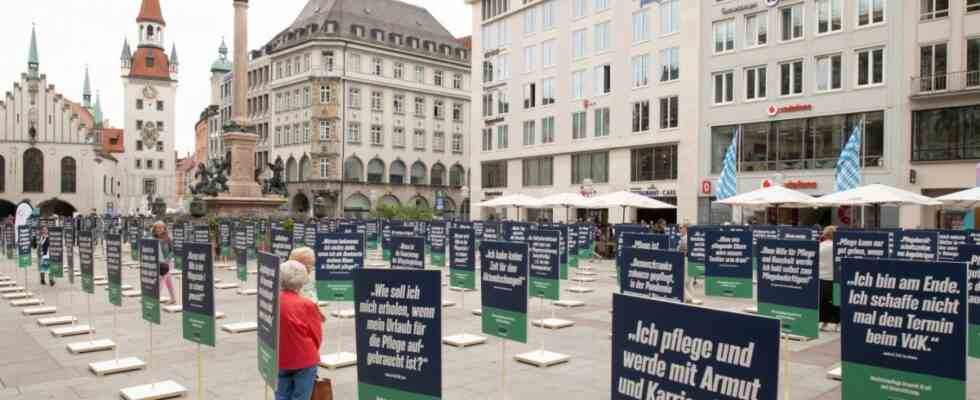From above, the forest of signs in front of the town hall on Marienplatz looks like a walk-in memorial. After all, the 300 green and blue posters are intended to shake people up and raise awareness. Because the social association VdK draws attention to the grievances in home care with this “silent demo” on Tuesday – not only in Munich, but also in six other inner cities such as Nuremberg, Augsburg, Würzburg, Bayreuth, Passau and Regensburg.
Those in need of care and their caring relatives hardly have a lobby. “And they have,” says VdK President Verena Bentele, “neither the strength nor the time to stand up for their own interests.” The sign forest should end this “invisibility” and “push charity”.
“Without care at home, the care system will collapse. Finally provide noticeable relief!” is a poster quote from Friedrich Ahl, 66, from Reinheim. 500,000 people in need of care live in Bavaria. 80 percent of them are cared for at home, two thirds exclusively by relatives. A total of 750,000 people care for their relatives. These are numbers that Ulrike Mascher, state chair of the social association in Bavaria, calls. And they confirm Friedrich Ahl. Because Mascher also warns that this system is on the verge of “collapse”. A first meaningful nursing study initiated by the VdK in 2021 proves this concern. 56,000 members took part nationwide. According to Mascher, 22.3 percent in Bavaria stated in the survey that they spend more than 40 hours a week on care.
Every third caring relative complains about daily complaints
“My wife is 84 and needs care, I’ll be 76 – and now?” Friedrich Reimann, 75, from Berlin vents on a poster. According to the VdK study, a third of caring relatives are already retired. Not only them, but also all other caregivers make the “care of the neighbor” to create. Many can no longer sleep through the night, often not even leaving their relatives alone for an hour. But anyone who “constantly goes beyond their physical and mental limits,” says Bentele, “will eventually fail as a caregiver.” In Bavaria, 31.4 percent of caring relatives complain about daily complaints such as shortness of breath, dizziness, palpitations or diseases of the musculoskeletal system.
“More day care places! Our grandpa needs a place. Grandma can’t take it anymore.” Susanne Pfeil from Germering gives her caring relatives a voice on a poster in the forest of signs and thus points to a serious problem: the lack of day care places – not to mention night care places. It looks “dark” in Bavaria, says Ulrike Mascher. Social officer Dorothee Schiwy (SPD) explains that Munich only has “85 fixed places”.
The VdK calls for the expansion of day care
The VdK calls for the expansion of relief offers and day care facilities, the crediting of home care to the pension and the de-bureaucratization of application processes. According to Bentele, services are often not called up. 93 percent of all caregivers nationwide would never have used day care. Clarification would be necessary, says Bentele. “Many beneficiaries don’t even know what their rights are.” Care centers might help. District President Josef Mederer explains that these exist in 16 of 23 Upper Bavarian districts. The city of Munich does not have a care base, but relies on 32 old people’s and service centers that also offer advice on the subject of neighborly care. As well as at 13 specialist centers for caring relatives. Health officer Beatrix Zurek (SPD) wants to highlight the city’s offers even more “specifically and clearly”.
Something’s going on in the forest of signs. Lots of people go through. Some take photos, some discuss in front of the posters. A 55-year-old visitor from Saxony-Anhalt said spontaneously: “This is a good idea. The people who care for their relatives need recognition!”

